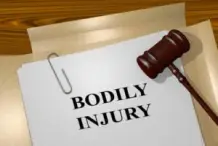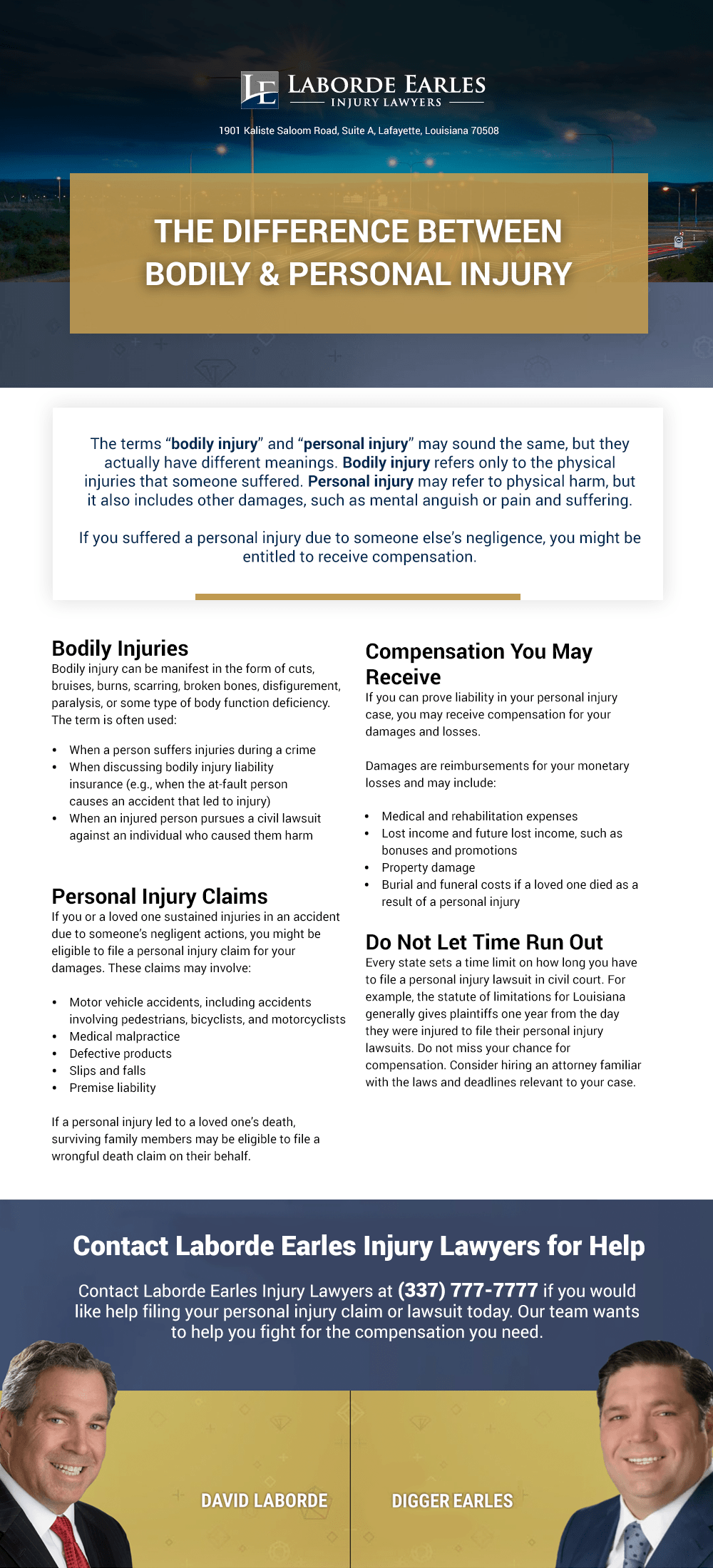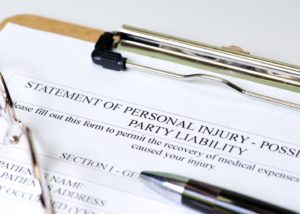
While they may sound very similar and are sometimes used interchangeably, there is a difference between the terms “bodily injury” and “personal injury.” They both refer to harm suffered by an individual, but bodily injury refers only to physical injuries, whereas personal injury includes a range of damages that may go beyond just physical harm to include other damages like pain and suffering. Personal injury also involves another party’s negligence or fault.
If you or a loved one has suffered any type of personal injury due to another party’s negligence, you may be entitled to compensation. A Louisiana personal injury lawyer can examine your individual situation, determine if you have grounds for a personal injury lawsuit, and pursue a settlement on your behalf.
Types of Bodily Injuries
Bodily injury refers to physical injuries to the body such as broken bones, cuts and bruises, burns, disfigurement, scarring, paralysis, or impairment of body function. The term is often used in:
- Criminal law, when talking about injuries a person received from a crime
- Insurance, when talking about bodily injury liability insurance to compensate someone when the insured causes an accident in which others are hurt
- Civil lawsuits, when an injured party goes beyond insurance and pursues a claim for compensation against an individual who caused harm
In a successful insurance claim or lawsuit, you will receive compensation for your expenses related to bodily injury.
Laborde Earles injury was great for me they took care of me very fast and professional. If for any reason I need legal help they will be who I use.
ClientPersonal Injury Claims
Personal injury claims deal with bodily and other injuries sustained in a wide range of accidents or incidents. These may include:
- Vehicle accidents involving cars, trucks, motorcycles, and/or pedestrians
- Slip and fall accidents
- Defective products
- Medical malpractice
- Premise liability: when you are hurt on someone else’s property due to a danger they should have fixed or warned about
- Wrongful death: wrongful death is like a personal injury claim, but since the injured person has died, a claim is brought on behalf of the deceased’s survivors or estate
- Defamation of character
You may bring a personal injury claim for compensation if you have been injured because another party has acted in a negligent, reckless, careless, or intentional manner and you suffered damages as a result. These damages do not have to be physical, and may include pain and suffering or damage to your reputation.
I thank God for Digger & David. I don’t know what we would have done if it hadn’t have been for them.
Rick Smith | ClientProving Negligence in Personal Injury
In a personal injury case, you, the plaintiff, must show that another party, the defendant, acted negligently. To do so, your attorney must prove the following main elements:
- The defendant owed you a duty of care not to cause harm
- The defendant failed to meet their duty of care
- The defendant’s actions or failure to act was the direct cause of your losses or injuries
- You suffered damages as a result
The duty of care would depend on the circumstances since responsible parties have the duty to avoid accidents that harm others. For example, store owners should clean up spills that could cause falls, and drivers should not text while driving.
The reassurance from Digger and his staff gave me that renewed hope that it’s going to be okay down the road.
ClientDamage Awards in Personal Injury Cases
If you have suffered an injury in Louisiana, you may be able to receive compensation for your damages from insurance or a personal injury lawsuit. Insurance companies hire high-powered attorneys to attempt to pay out as little as possible, so it helps to have an attorney on your side to negotiate and get you the best settlement possible. If negotiations fail or insurance does not cover your losses, you may try to collect damages through a lawsuit.
In a successful Louisiana lawsuit, you may be awarded special damages and general damages.
Special damages are payments for your monetary losses and expenses. These may include:
- Reimbursement for medical and therapy expenses
- Lost wages, and projected future losses
- Property damage
- Funeral costs, in case of a death
General damages are for less-tangible costs that it is difficult to put a monetary value on, such as pain and suffering and loss of companionship and quality of life.
There is no limit on the amount of damages you may receive in Louisiana, except a cap of $500,000 in cases of medical malpractice, per Louisiana State Legislature § 1231.2. Louisiana will also grant punitive damages in some cases of extreme, wanton, and reckless negligence.
They treated us like no other people would. Whenever we needed something they were there for us. I put my trust in them and I don’t regret it.
ClientGet Legal Assistance
If you or a loved one has been injured in Louisiana, a personal injury lawyer may be able to help you further understand the difference between bodily injury and personal injury, and help you get the compensation you are entitled to. According to Louisiana Civil Code Article 3492, there is a strict time limit of one year from the day the injury occurred to file a lawsuit, so it makes sense to reach out to a legal professional as soon as possible.
At Laborde Earles Injury Lawyers, we offer a free consultation to discuss your individual injury situation and determine the best way to pursue getting you the compensation you deserve. You pay nothing unless and until we win a settlement, so call us today at (337) 777-7777.






